An old (and, alas, they’re all old now) interview with Douglas Adams from the May 1985 issue of Macworld. Transcription is via OSX’s images to text service.
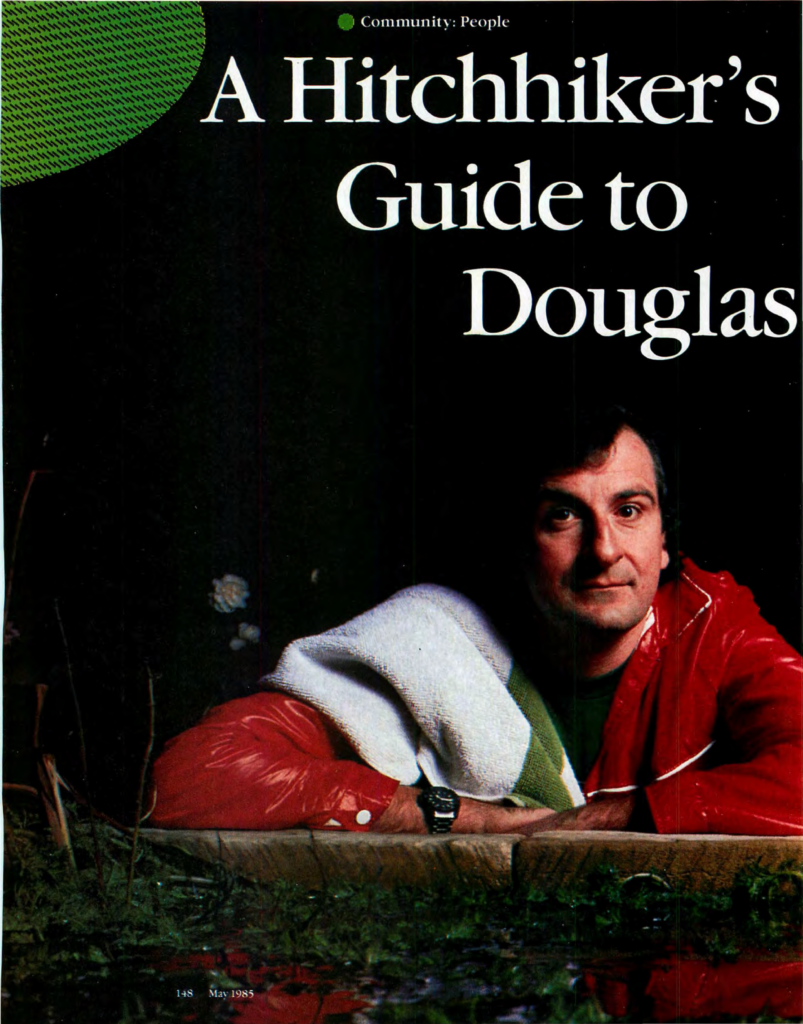
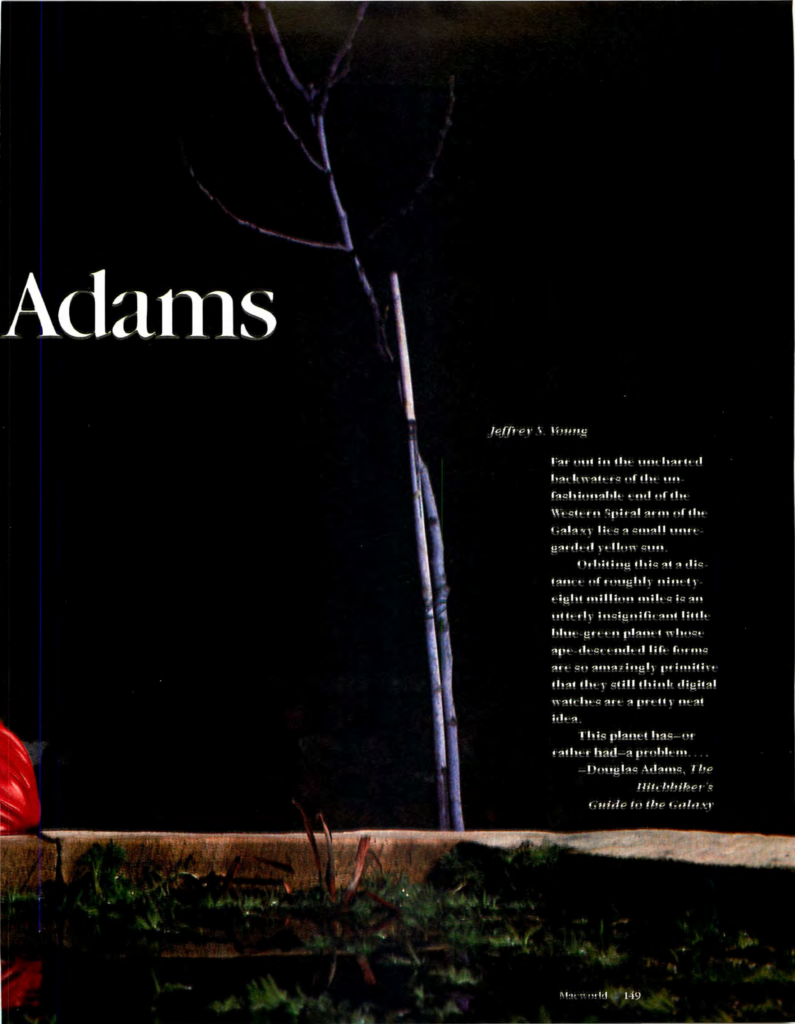
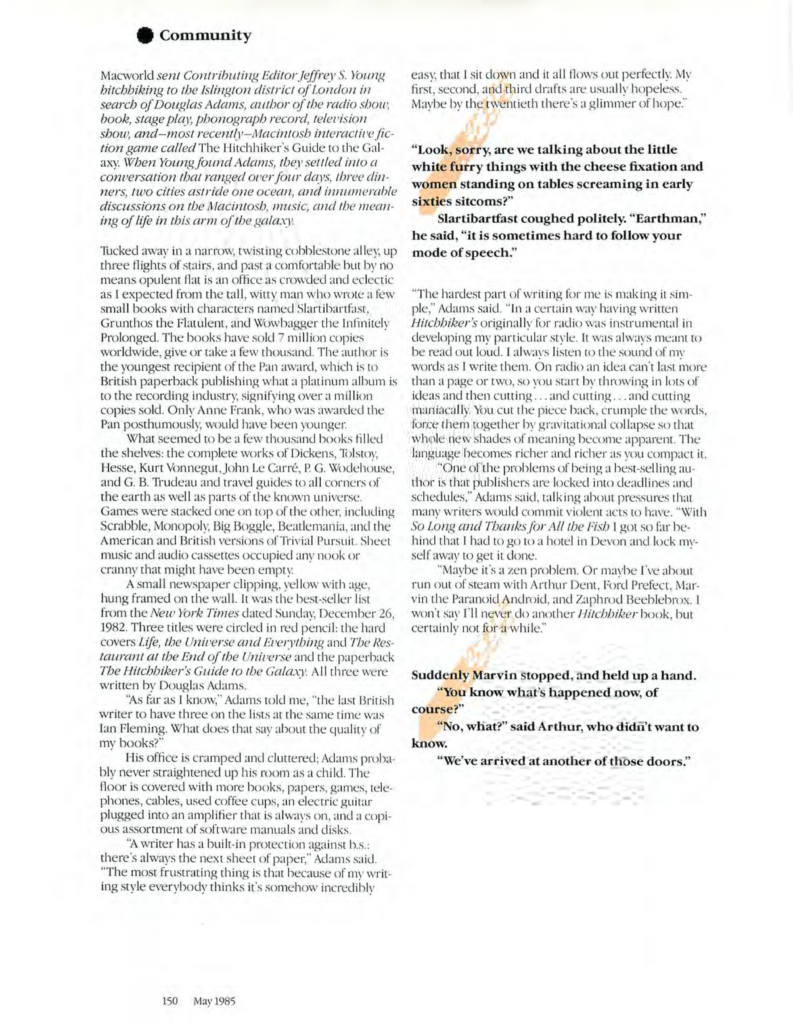
Macworld sent Contributing Editor Jeffrey S. Youny
hitchhiking to the Islington district of London in
search of Douglas Adams, author of the radio shou,
book, stage play, phonograph record, television
show. and-most recently-Macintosh interactive fic-
tion game called The Hitchhiker’s Guide to the Gal-
axy. When Young found Adams, they settled into a
conversation that ranged over four days, three din-
ners. two cities astride one ocean, and innumerable
discussions on the Macintosh, music, and the mean-
ing of life in this arm of the galaxy.
Tucked away in a narrow, twisting cobblestone alley, up
three flights of stairs, and past a comfortable but by no
means opulent flat is an office as crowded and eclectic
as I expected from the tall, witty man who wrote a few
small books with characters named Slartibartfast,
Grunthos the Flatulent, and Wowbagger the Infinitely
Prolonged. The books have sold 7 million copies
worldwide, give or take a few thousand. The author is
the youngest recipient of the Pan award, which is to
British paperback publishing what a platinum album is
to the recording industry, signifying over a million
copies sold. Only Anne Frank, who was awarded the
Pan posthumously, would have been vounger.
What seemed to be a few thousand books filled
the shelves: the complete works of Dickens, Tolstoy,
Hesse, Kurt Vonnegut, John Le Carré, P. G. Wodehouse,
and G. B. Trudeau and travel guides to all corners of
the earth as well as parts of the known universe.
Games were stacked one on top of the other, including
Scrabble, Monopoly, Big Boggle, Beatlemania, and the
American and British versions of Trivial Pursuit. Sheet
music and audio cassettes occupied anv nook or
cranny that might have been empty.
A small newspaper clipping, yellow with age,
hung framed on the wall. It was the best-seller list
from the New York Times dated Sunday, December 26,
Three titles were circled in red pencil: the hard
covers Life, the Universe and Everything and The Res-
taurant al the End of the Universe and the paperback
The Hitchhiker’s Guide to the Galaxy. All three were
written by Douglas Adams.
“As far as I know,” Adams told me, “the last British
writer to have three on the lists at the same time was
lan Fleming. What does that say about the quality of
my books?’
His office is cramped and cluttered; Adams proba-
bly never straightened up his room as a child. The
floor is covered with more books, papers, games, tele.
phones, cables, used coffee cups, an electric guitar
plugged into an amplifier that is always on, and a copi-
ous assortment of software manuals and disks.
“A writer has a built-in protection against b.s.:
there’s always the next sheet of paper.” Adams said.
“The most frustrating thing is that because of my writ-
ing style everybody thinks it’s somehow incredibly
easy, that I sit down and it all flows out perfectly. My
first, second, and third drafts are usually hopeless.
Maybe by the twentieth there’s a glimmer of hope.
“Look, sorry, are we talking about the little
white furry things with the cheese fixation and
women standing on tables screaming in early
sixties sitcoms?”
Slartibartfast coughed politely. “Earthman,”
he said, “it is sometimes hard to follow your
mode of speech.”
“The hardest part of writing for me is making it sim-
ple,” Adams said. “In a certain way having written
Hitchhiker’s originally for radio was instrumental in
developing my particular style. It was always meant to
be read out loud. Lalwars listen to the sound of my
words as I write them. On radio an idea can’t last more
than a page or two, so vou start by throwing in lots of
ideas and then cutting… and cutting..and cutting
maniacally. You cut the piece back, crumple the words,
force them together by gravitational collapse so that
whole new shades of meaning become apparent. The
language becomes richer and richer as vou compact it.
“One of the problems of being a best-selling au
thor is that publishers are locked into deadlines and
schedules,” Adams said, talking about pressures that
many writers would commit violent acts to have. “With
So Long and Thanks for All the Fish I got so far be-
hind that I had to go to a hotel in Devon and lock my-
self away to get it done.
“Maybe it’s a zen problem. Or mavhe I’ve about
run out of steam with Arthur Dent, Ford Prefect. Mar-
vin the Paranoid Android, and Zaphrod Beeblebrox.
won’t sav TIl never do another Hitchhiker book, but
certainlv not for a while
Suddenly Marvin stopped, and held up a hand.
“You know what’s happened now, of
course?”
“No, what?” said Arthur, who didn’t want to
know.
“We’ve arrived at another of those doors”
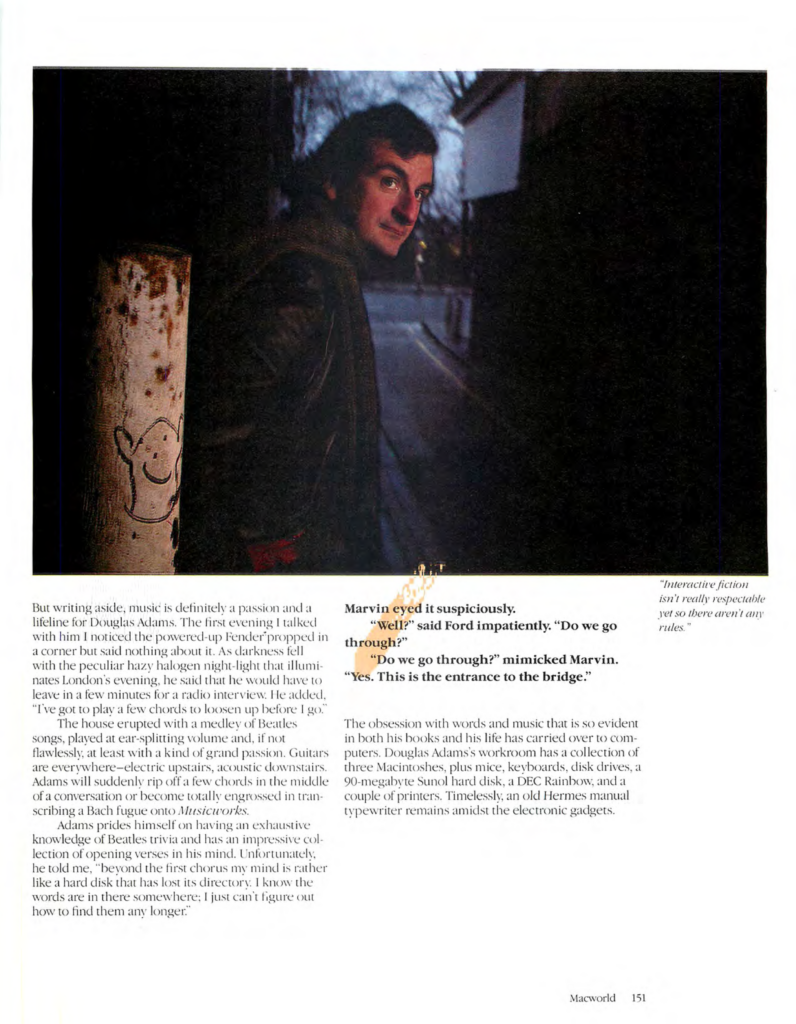
But writing aside, music is definitely a passion and a
lifeline for Douglas Adams. The first evening I talked
with him I noticed the powered-up Fender propped in
a corner but said nothing about it. As darkness fell
with the peculiar hazy halogen night-light that illumi-
nates London’s evening, he said that he would have to
leave in a few minutes for a radio interview. He added.
“I’ve got to play a few chords to loosen up before I go.
The house erupted with a medlev of Beatles
songs, played at ear-splitting volume and, if not
flawlessly, at least with a kind of grand passion. Guitars
are everywhere-electric upstairs, acoustic downstairs.
Adams will suddenlv rip off a few chords in the middle
of a conversation or become totally engrossed in tran-
scribing a Bach fugue onto Musicworks.
Adams prides himself on having an exhaustive
knowledge of Beatles trivia and has an impressive col-
lection of opening verses in his mind. Unfortunatel:
he told me.
“bevond the first chorus my mind is rather
like a hard disk that has lost its director: I know the
words are in there somewhere; I just can’t figure out
how to find them any longer.
Marvin eyed it suspiciously.
“Well?” said Ford impatiently. “Do we go
through?”
“Do we go through?” mimicked Marvin.
“Yes. This is the entrance to the bridge.”
The obsession with words and music that is so evident
in both his books and his life has carried over to com-
puters. Douglas Adams’s workroom has a collection of
three Macintoshes, plus mice, kevboards, disk drives, a
90-megabyte Sunol hard disk, a DEC Rainbow, and a
couple of printers. Timelesslv, an old Hermes manual
tvpewriter remains amidst the electronic gadgets.
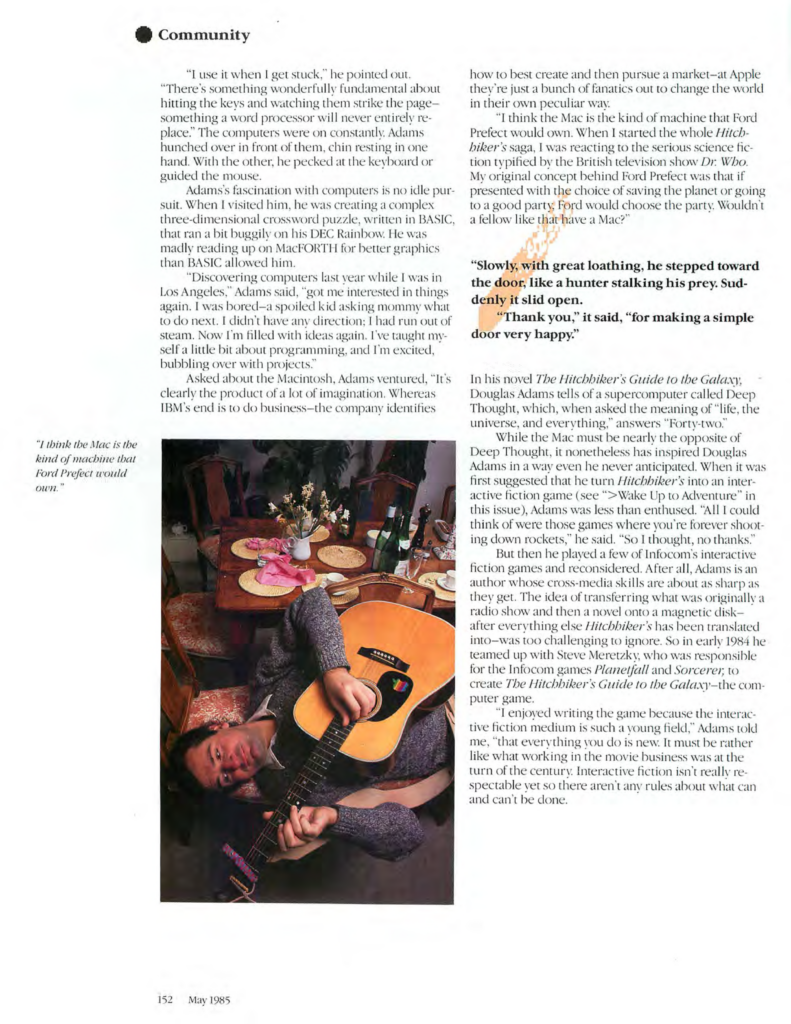
“I use it when I get stuck,” he pointed out.
“There’s something wonderfully fundamental about
hitting the keys and watching them strike the page-
something a word processor will never entirely re-
place!
The computers were on constantly. Adams
hunched over in front of them, chin resting in one
hand. With the other, he pecked at the keyboard or
guided the mouse.
Adams’s fascination with computers is no idle pur-
suit. When I visited him, he was creating a complex
three-dimensional crossword puzzle, written in BASIC
that ran a bit buggily on his DEC Rainbow: He was
madlv reading up on MacFORTH for better graphics
than BASIC allowed him.
“Discovering computers last ver while I was in
Los Angeles,” Adams said, “got me interested in things
again. I was bored-a spoiled kid asking mommy what
to do next. I didn’t have any direction; I had run out of
steam. Now I’m filled with ideas again. I ve taught my-
self a little bit about programming, and I’m excited,
bubbling over with projects
Asked about the Macintosh, Adams ventured,
“Irt
clearly the product of a lot of imagination. Whereas
IBM’s end is to do business-the company identifies
how to best create and then pursue a market-at Apple
thev’re just a bunch of fanatics out to change the world
in their own peculiar way.
“I think the Mac is the kind of machine that Ford
Prefect would own. When I started the whole Hitch-
hiker’s saga, I was reacting to the serious science fic-
tion typified by the British television show Dr: Who.
My original concept behind Ford Prefect was that if
presented with the choice of saving the planet or going
to a good party, Ford would choose the part: Wouldn’t
a fellow like that have a Mac?”
“Slowly, with great loathing, he stepped toward
the door, like a hunter stalking his prey. Sud-
denly it slid open.
“Thank you,” it said, “for making a simple
door very happy.”
In his novel The Hitchhiker’s Guide to the Galaxy,
Douglas Adams tells of a supercomputer called Deep
Thought, which, when asked the meaning of “life, the
universe, and everything,” answers “Forty-tWo.
While the Mac must be nearlv the opposite of
Deep Thought, it nonetheless has inspired Douglas
Adams in a wav even he never anticipated. When it was
first suggested that he turn Hitchhiker’s into an inter-
active fiction game (see “> Wake Up to Adventure” in
this issue), Adams was less than enthused. “All I could
think of were those games where you’re forever shoot-
ing down rockets,” he said. “So I thought, no thanks.
But then he plaved a few of Infocom’s interactive
fiction games and reconsidered. After all, Adams is an
author whose cross-media skills are about as sharp as
they get. The idea of transferring what was originally a
radio show and then a novel onto a magnetic disk-
after everything else Hitchhiker’s has been translated
into-was too challenging to ignore. So in earlv 1984 he
teamed up with Steve Meretzky, who was responsible
for the Infocom games Planetfall and Sorcerer, to
create The Hitchhiker’s Guide to the Galaxy-the com-
puter game.
“I enjoved writing the game because the interac-
tive fiction medium is such a young field, Adams told
me, “that everything vou do is new. It must be rather
like what working in the movie business was at the
turn of the centurv. Interactive fiction isn’t reallvre-
spectable vet so there aren’t an rules about what can
and can’t be done.
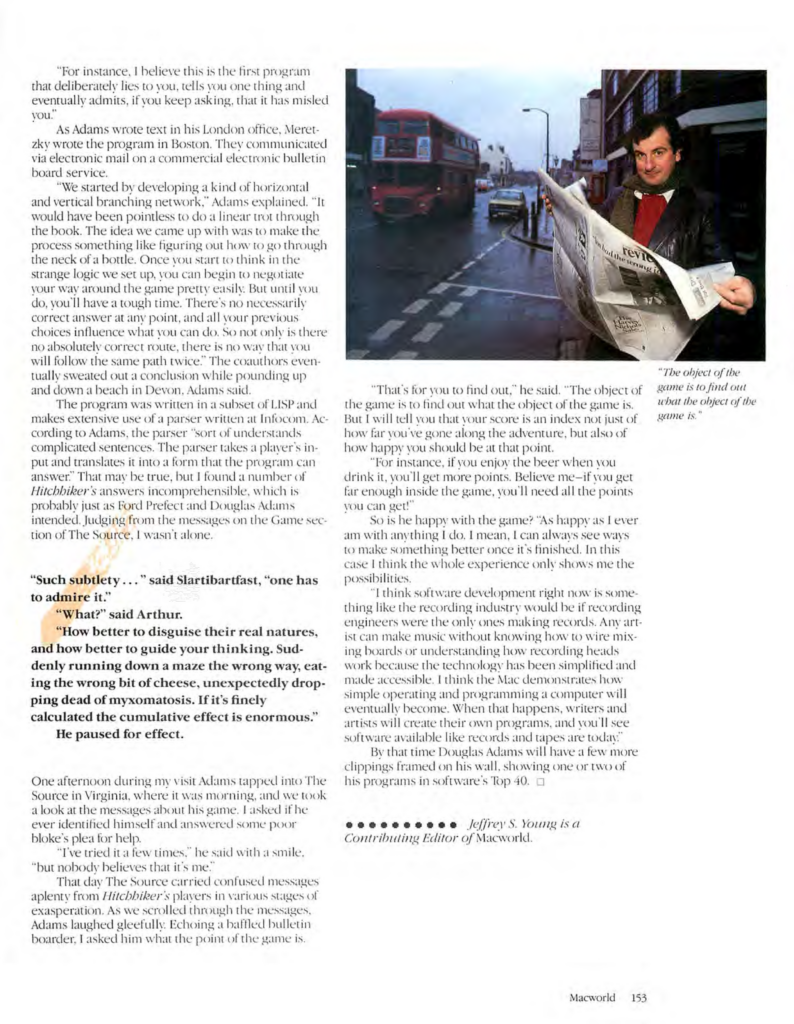
“For instance. I believe this is the first program
that deliberatelv lies to vou, tells vou one thing and
eventually admits, if vou keep asking, that it has misled
vou.
As Adams wrote text in his London office. Meret-
zky wrote the program in Boston. They communicated
via electronic mail on a commercial electronic bulletin
board service.
*We started by developing a kind of horizontal
and vertical branching network.” Adams explained. “It
would have been pointless to do a linear trot through
the book. The idea we came up with was to make the
process something like figuring out how to go through
the neck of a bottle. Once vou start to think in the
strange logic we set up, vou can begin to negotiate
your way around the game pretty easilv: But until vou
do, vou’ll have a tough time. There’s no necessarilv
correct answer at any point, and all vour previous
choices influence what vou can do. So not only is there
no absolutelv correct route, there is no way that vou
will follow the same path twice” The coauthors even-
tally sweated out a conclusion while pounding up
and down a beach in Devon. Adams said.
The program was written in a subset of LISP and
makes extensive use of a parser written at Infocom. Ac-
cording to Adams, the parser “sort of understands
complicated sentences. The parser takes a plaver’s in-
put and translates it into a form that the program can
answer.” That may be true. but I found a number of
Hitchhiker’s answers incomprehensible, which is
probably just as Ford Prefect and Douglas Adams
intended. Judging from the messages on the Game sec-
tion of The Source, I wasnt alone.
“Such subtlety …
” said Slartibartfast, “one has
to admire it.”
“What?” said Arthur.
“How better to disguise their real natures,
and how better to guide your thinking. Sud-
denly running down a maze the wrong way, eat-
ing the wrong bit of cheese, unexpectedly drop-
ping dead of myxomatosis. If it’s finely
calculated the cumulative effect is enormous.
He paused for effect.
One afternoon during my visit Adams tapped into The
Source in Virginia, where it was morning, and we took
a look at the messages about his game. asked if he
ever identified himself and answered some poor
bloke’s plea for help.
“I’ve tried it a few times.” he said with a smile.
“but nobodv believes that it’s me.
That dav The Source carried confused messages
aplenty from Hitchhiker’s pavers in various stages of
exasperation. As we scrolled through the messages,
Adams laughed gleefully: Echoing a baffled bulletin
boarder. I asked him what the point of the game is.
“That’s for vou to find out,
” he said. “The object of
the game is to find out what the object of the game is.
But I will tell vou that vour score is an index not just of
how far you’ve gone along the adventure, but also of
how happy you should be at that point.
“For instance, it vou enjor the beer when vou
drink it, vou’ll get more points. Believe me-if you get
far enough inside the game, you’ll need all the points
you can get!”
So is he happy with the game? “As happy as I ever
am with anything I do. I mean, I can always see ways
to make something better once its finished. In this
case I think the whole experience only shows me the
possibilities.
“I think software development right now is some.
thing like the recording industry would be if recording
engineers were the only ones making records. Any art
ist can make music without knowing how to wire mix-
ing boards or understanding how recording heads
work because the technology has been simplified and
made accessible. I think the Mac demonstrates how
simple operating and programming a computer will
eventually become. When that happens, writers and
artists will create their own programs, and you’ll see
software available like records and tapes are todil
By that time Douglas Adams will have a few more
clippings framed on his wall, showing one or two of
his programs in software’s Top 40.
Jeffrer S. Young is d
Contributing Editor of Macworld